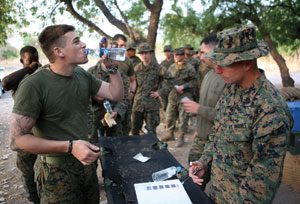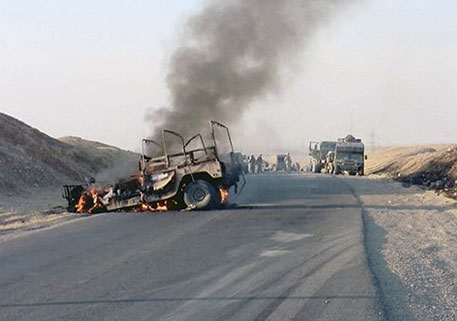Malaria Medications Impacting Veteran Mental Health

Despite known risks of antimalarial medication, the Department of Defense issued mefloquine to U.S. troops for nearly a quarter century. Now, VA disability examiners may be misattributing its chronic adverse effects to PTSD.
From nuclear testing to Agent Orange to burn pits, the American military has a decadeslong history of inadvertently exposing service members to a range of harmful toxicants responsible for myriad long-term health issues. But there are certain exposures—those which have known dangers—that, as a matter of policy or apparent necessity, have been purposefully introduced to military personnel. This is true of the antimalarial drug mefloquine, which was administered to hundreds of thousands of deployed U.S. troops despite the Pentagon’s and health professionals’ awareness of its adverse effects.
Mefloquine, a pill taken weekly, was developed in the 1960s and 1970s by the Walter Reed Army Institute of Research after a drug-resistant strain of malaria sickened troops in Vietnam. It was widely prescribed to U.S. service members from 1989, when it was approved by the Food and Drug Administration, until 2009, when the Department of Defense issued directives effectively making it a last-choice drug for troops.
“It was recognized around the time of its U.S. licensing that there were very significant problems with this drug,” said Dr. Remington Nevin, a board-certified physician epidemiologist and former Army preventive medicine officer who has authored more than 30 scientific publications on malaria and antimalarial medication. “It was clearly known that some people became psychotic and some people became very violent, but at the time, it wasn’t appreciated just how serious these neuropsychiatric effects could be in terms of causing lasting disabilities.”
Nevin noted that the known dangers of mefloquine (previously marketed in the U.S. as Lariam) were such that its manufacturer, Swiss multinational pharmaceutical company Roche Holding AG (Roche), and the FDA agreed to language in the initial product insert that warned certain symptoms—anxiety, depression, restlessness or confusion—should be considered as early signs of a “more serious event” and the drug must be immediately discontinued by its user.
However, according to Nevin, most troops didn’t receive those warnings or have logistical access to alternative medications while deployed. There was also no way for DOD medical personnel to identify ahead of time who was susceptible to the drug’s neurotoxicity, estimated to be anywhere from one-quarter to two-thirds of its users.
“Instead, the military said, ‘Here’s your mefloquine, you’re getting on the plane, you may have some crazy dreams, but suck it up and drive on,’” said Nevin, who now serves as executive director of The Quinism Foundation, a group dedicated to supporting research on quinoline drugs. “So, we systematically ignored and undermined the critical safety warnings in the product insert.”
After various international studies confirmed mefloquine’s potential for causing psychological illness, and a growing list of its neuropsychiatric adverse effects—including vertigo, tinnitus, insomnia, vivid nightmares, visual and auditory hallucinations, paranoia, seizures, mood swings and suicidal ideations—became more well known, Roche pulled the drug off U.S. shelves. Eventually, in 2013, the FDA issued its strongest “black box” warning, that mefloquine can cause long-lasting and even permanent damage, bringing an end to the DOD’s nearly quarter-century use of the drug.
Exposure to antimalarial drugs has been introduced as a possible factor in several cases of violent murder over the past two decades. Cases include Army Staff Sgt. Robert Bales, who pleaded guilty to avoid the death penalty for slaying 16 Afghan civilians in Kandahar Province, Afghanistan, in March 2012, as well as four soldiers who killed their spouses over a six-week stretch in 2002 at Fort Bragg, N.C. This factor was also discussed when a group of soldiers from Fort Carson, Colo., were charged with manslaughter after throwing an Iraqi man in the Tigris River in 2004.
In a 2013 publication, Nevin and other military medical professionals argued that mefloquine can produce “derealization and depersonalization, compulsions toward dangerous objects, and morbid curiosity about death.” It can also produce dissociative effects that make someone performing violent acts think someone else is committing the crime.
Unfortunately for veterans affected by mefloquine, the Department of Veterans Affairs does not recognize an association between the drug and negative mental health outcomes. This is, in part, because of a joint VA-DOD study that notes there are no significant associations between mefloquine and mental health issues.
The 2018 publication, using data from a records study of 60,000 U.S. veterans who served between 2001 and 2008, found that reported negative physical and mental health outcomes are largely due to combat deployment exposure.
However, context is key. Not only did the joint study rely solely on record reviews of self-reported symptoms, which is problematic since most troops don’t report psychiatric issues, but it was also not based on scientific diagnoses and did not have specific test subjects with a control group.
Alarmingly, a 2015 clinicians book focusing on post-traumatic stress disorder and related diseases in combat veterans does note that the acute symptoms of mefloquine intoxication may mimic and be mistaken for a number of acute psychiatric disorders, including PTSD.
“It’s really a hidden epidemic, because so few people attribute these problems to the drug—there’s always something else they attribute it to because it’s taken during deployment, where there’s so many other things happening,” said Nevin, who warned that VA disability examiners may be misattributing mefloquine intoxication to PTSD.
In a 2018 letter to Dr. Paul R. Lawrence, the VA under secretary for benefits, Nevin offered a simple solution for rectifying these possible misdiagnoses: “Screening for such symptomatic exposure during a medical disability examination can be as quick and simple as asking the veteran, ‘Did you take mefloquine,’ and if so, ‘While you were taking the drug, did you experience one or more of these symptoms?’” he wrote.
In doing so, he argued, “examiners should retain an index of suspicion that any chronic neurologic or psychiatric symptoms, including those reported, could represent effects of mefloquine poisoning.”
“DOD not only dropped the ball in administering mefloquine in the first place, it also failed in its record-keeping of who and how many service members took it,” said Deputy National Legislative Director for Benefits Shane Liermann. “Recently, the VA has contracted with the National Academy of Medicine to study the long-term health effects of antimalarial medications. We are hoping this will overcome the shortcomings of the joint 2018 VA-DOD study and provide a path for Congress to establish presumptive service connection for any diseases or disorders found to be associated with the use of antimalarials like mefloquine.”
For his part, Nevin stated the DOD’s role in developing and administering mefloquine is what makes this issue a bitter pill to swallow.
“The drug company and the military knew all along, but they didn’t advertise or emphasize it,” said Nevin. “And as a result, we’ve unintentionally poisoned an entire generation of veterans with this drug.”
Learn more
Veterans who have questions about Mefloquine or other service-related injuries can contact their local DAV service office at benefitsquestions.org.
The military said, ‘Here’s your mefloquine, you’re getting on the plane, you may have some crazy dreams, but suck it up and drive on.’ So, we systematically ignored and undermined the critical safety warnings.
Dr. Remington Nevin







